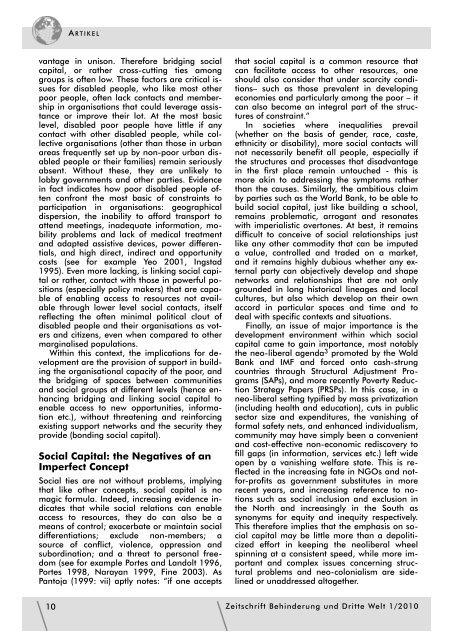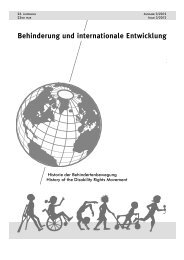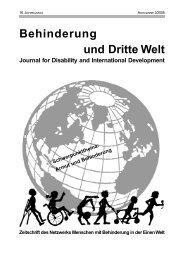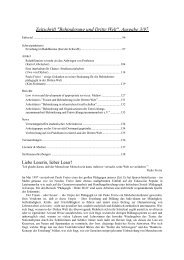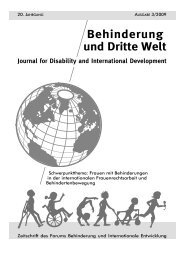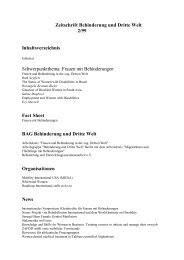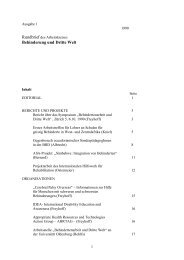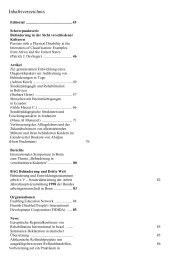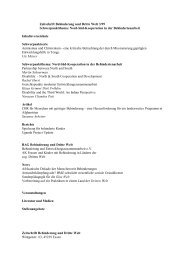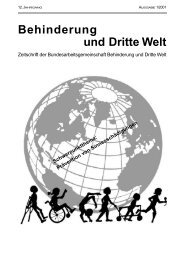Disaster and Disability in Bangladesh - Behinderung und Dritte Welt
Disaster and Disability in Bangladesh - Behinderung und Dritte Welt
Disaster and Disability in Bangladesh - Behinderung und Dritte Welt
You also want an ePaper? Increase the reach of your titles
YUMPU automatically turns print PDFs into web optimized ePapers that Google loves.
A RTIKELvantage <strong>in</strong> unison. Therefore bridg<strong>in</strong>g socialcapital, or rather cross-cutt<strong>in</strong>g ties amonggroups is often low. These factors are critical issuesfor disabled people, who like most otherpoor people, often lack contacts <strong>and</strong> membership<strong>in</strong> organisations that could leverage assistanceor improve their lot. At the most basiclevel, disabled poor people have little if anycontact with other disabled people, while collectiveorganisations (other than those <strong>in</strong> urbanareas frequently set up by non-poor urban disabledpeople or their families) rema<strong>in</strong> seriouslyabsent. Without these, they are unlikely tolobby governments <strong>and</strong> other parties. Evidence<strong>in</strong> fact <strong>in</strong>dicates how poor disabled people oftenconfront the most basic of constra<strong>in</strong>ts toparticipation <strong>in</strong> organisations: geographicaldispersion, the <strong>in</strong>ability to afford transport toattend meet<strong>in</strong>gs, <strong>in</strong>adequate <strong>in</strong>formation, mobilityproblems <strong>and</strong> lack of medical treatment<strong>and</strong> adapted assistive devices, power differentials,<strong>and</strong> high direct, <strong>in</strong>direct <strong>and</strong> opportunitycosts (see for example Yeo 2001, Ingstad1995). Even more lack<strong>in</strong>g, is l<strong>in</strong>k<strong>in</strong>g social capitalor rather, contact with those <strong>in</strong> powerful positions(especially policy makers) that are capableof enabl<strong>in</strong>g access to resources not availablethrough lower level social contacts, itselfreflect<strong>in</strong>g the often m<strong>in</strong>imal political clout ofdisabled people <strong>and</strong> their organisations as voters<strong>and</strong> citizens, even when compared to othermarg<strong>in</strong>alised populations.With<strong>in</strong> this context, the implications for developmentare the provision of support <strong>in</strong> build<strong>in</strong>gthe organisational capacity of the poor, <strong>and</strong>the bridg<strong>in</strong>g of spaces between communities<strong>and</strong> social groups at different levels (hence enhanc<strong>in</strong>gbridg<strong>in</strong>g <strong>and</strong> l<strong>in</strong>k<strong>in</strong>g social capital toenable access to new opportunities, <strong>in</strong>formationetc.), without threaten<strong>in</strong>g <strong>and</strong> re<strong>in</strong>forc<strong>in</strong>gexist<strong>in</strong>g support networks <strong>and</strong> the security theyprovide (bond<strong>in</strong>g social capital).Social Capital: the Negatives of anImperfect ConceptSocial ties are not without problems, imply<strong>in</strong>gthat like other concepts, social capital is nomagic formula. Indeed, <strong>in</strong>creas<strong>in</strong>g evidence <strong>in</strong>dicatesthat while social relations can enableaccess to resources, they do can also be ameans of control; exacerbate or ma<strong>in</strong>ta<strong>in</strong> socialdifferentiations; exclude non-members; asource of conflict, violence, oppression <strong>and</strong>subord<strong>in</strong>ation; <strong>and</strong> a threat to personal freedom(see for example Portes <strong>and</strong> L<strong>and</strong>olt 1996,Portes 1998, Narayan 1999, F<strong>in</strong>e 2003). AsPantoja (1999: vii) aptly notes: “if one acceptsthat social capital is a common resource thatcan facilitate access to other resources, oneshould also consider that <strong>und</strong>er scarcity conditions–such as those prevalent <strong>in</strong> develop<strong>in</strong>geconomies <strong>and</strong> particularly among the poor – itcan also become an <strong>in</strong>tegral part of the structuresof constra<strong>in</strong>t.”In societies where <strong>in</strong>equalities prevail(whether on the basis of gender, race, caste,ethnicity or disability), more social contacts willnot necessarily benefit all people, especially ifthe structures <strong>and</strong> processes that disadvantage<strong>in</strong> the first place rema<strong>in</strong> untouched - this ismore ak<strong>in</strong> to address<strong>in</strong>g the symptoms ratherthan the causes. Similarly, the ambitious claimby parties such as the World Bank, to be able tobuild social capital, just like build<strong>in</strong>g a school,rema<strong>in</strong>s problematic, arrogant <strong>and</strong> resonateswith imperialistic overtones. At best, it rema<strong>in</strong>sdifficult to conceive of social relationships justlike any other commodity that can be imputeda value, controlled <strong>and</strong> traded on a market,<strong>and</strong> it rema<strong>in</strong>s highly dubious whether any externalparty can objectively develop <strong>and</strong> shapenetworks <strong>and</strong> relationships that are not onlygro<strong>und</strong>ed <strong>in</strong> long historical l<strong>in</strong>eages <strong>and</strong> localcultures, but also which develop on their ownaccord <strong>in</strong> particular spaces <strong>and</strong> time <strong>and</strong> todeal with specific contexts <strong>and</strong> situations.F<strong>in</strong>ally, an issue of major importance is thedevelopment environment with<strong>in</strong> which socialcapital came to ga<strong>in</strong> importance, most notablythe neo-liberal agenda 3 promoted by the WoldBank <strong>and</strong> IMF <strong>and</strong> forced onto cash-strungcountries through Structural Adjustment Programs(SAPs), <strong>and</strong> more recently Poverty ReductionStrategy Papers (PRSPs). In this case, <strong>in</strong> aneo-liberal sett<strong>in</strong>g typified by mass privatization(<strong>in</strong>clud<strong>in</strong>g health <strong>and</strong> education), cuts <strong>in</strong> publicsector size <strong>and</strong> expenditures, the vanish<strong>in</strong>g offormal safety nets, <strong>and</strong> enhanced <strong>in</strong>dividualism,community may have simply been a convenient<strong>and</strong> cost-effective non-economic rediscovery tofill gaps (<strong>in</strong> <strong>in</strong>formation, services etc.) left wideopen by a vanish<strong>in</strong>g welfare state. This is reflected<strong>in</strong> the <strong>in</strong>creas<strong>in</strong>g fate <strong>in</strong> NGOs <strong>and</strong> notfor-profitsas government substitutes <strong>in</strong> morerecent years, <strong>and</strong> <strong>in</strong>creas<strong>in</strong>g reference to notionssuch as social <strong>in</strong>clusion <strong>and</strong> exclusion <strong>in</strong>the North <strong>and</strong> <strong>in</strong>creas<strong>in</strong>gly <strong>in</strong> the South assynonyms for equity <strong>and</strong> <strong>in</strong>equity respectively.This therefore implies that the emphasis on socialcapital may be little more than a depoliticizedeffort <strong>in</strong> keep<strong>in</strong>g the neoliberal wheelsp<strong>in</strong>n<strong>in</strong>g at a consistent speed, while more important<strong>and</strong> complex issues concern<strong>in</strong>g structuralproblems <strong>and</strong> neo-colonialism are sidel<strong>in</strong>edor unaddressed altogether.10 Zeitschrift Beh<strong>in</strong>derung <strong>und</strong> <strong>Dritte</strong> <strong>Welt</strong> 1/2010


